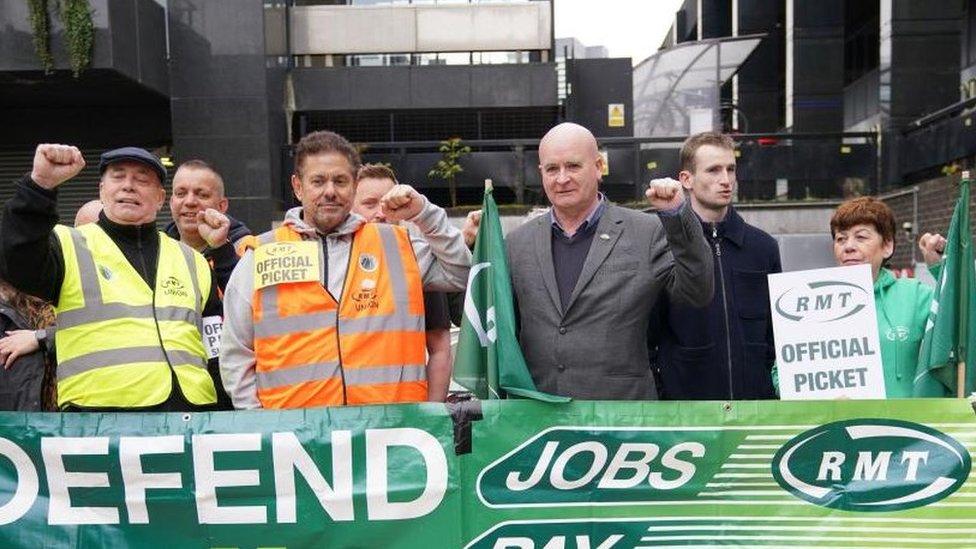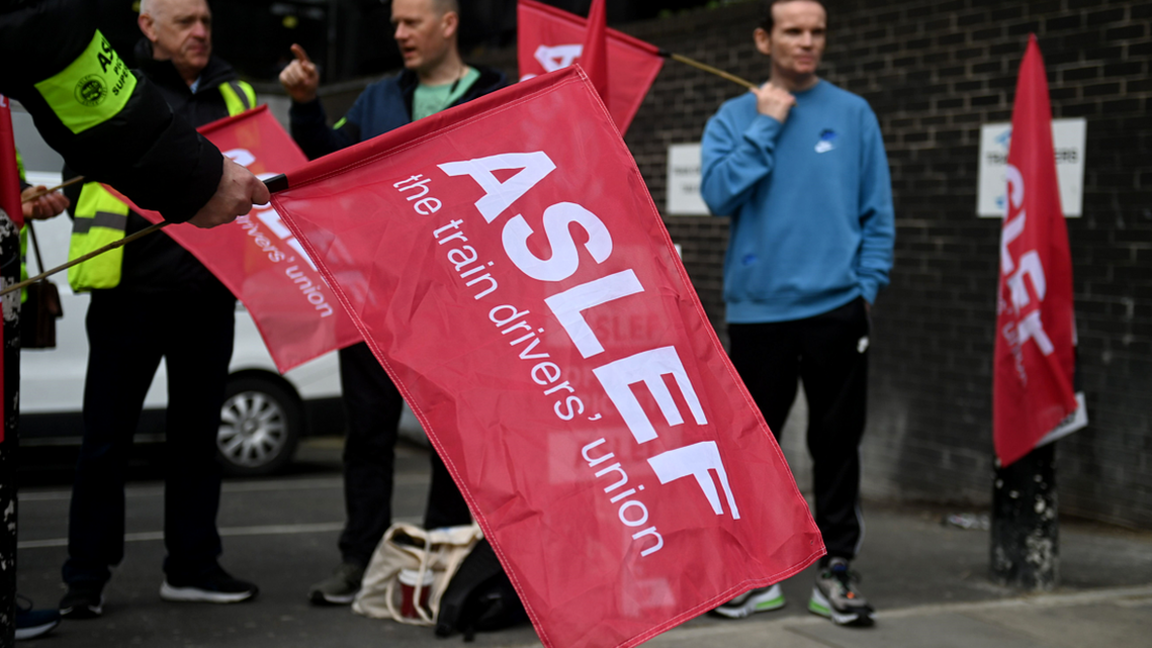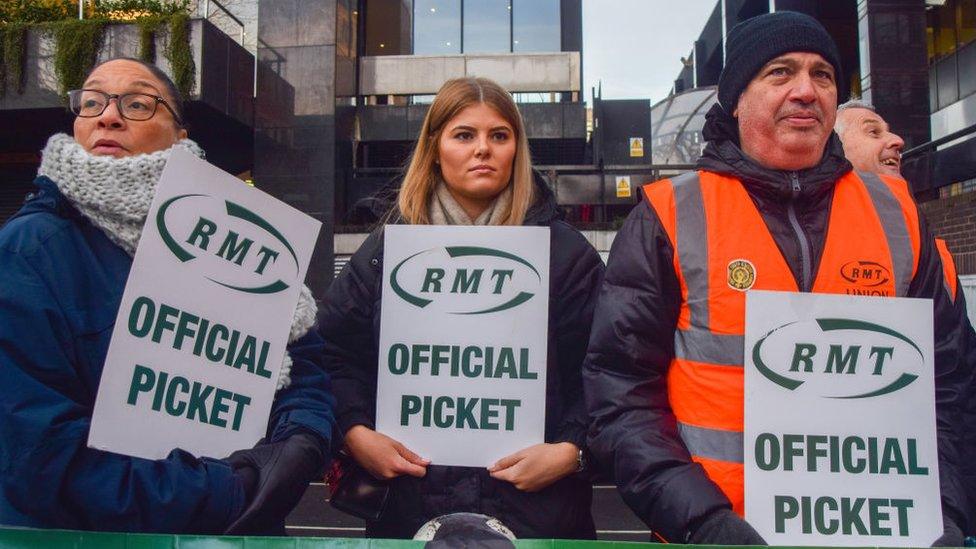Train strikes: RMT industrial action coincides with Eurovision final
- Published

RMT general secretary Mick Lynch (third from right) joins members of his union on Saturday outside Euston station
Rail passengers have faced travel disruption on the day of the Eurovision Song Contest final as RMT union members strike again in a long-running dispute over pay and conditions.
Fourteen train companies are affected, and operated limited services.
Transport Secretary Mark Harper said the strikes were "cynically targeting" the final, taking place in Liverpool on Saturday night.
But the RMT denies planning strikes to coincide with the event in Liverpool.
It said Saturday was chosen for a strike as it was the last date allowed under employment laws.
There will be no further strike action until 31 May.
Train companies warned , externalpassengers should be prepared for disruption on the days immediately after the strikes.
Train drivers who are part of a different union, Aslef, went on strike on Friday, with some parts of England having no trains all day. It also denies planning strikes to impact Eurovision.
Merseyrail, which operates trains around Liverpool, said it was unaffected by Saturday's strikes and would run late night services.
Most train companies travelling to and from Liverpool had a limited service as a result of the strike action, according to National Rail, external.
Speaking at a picket line outside London Euston station, Mr Lynch said was the last Saturday of the union's six-month mandate in which it could strike.
He then told BBC Radio 4's Today Programme: "We've not targeted Wembley or Liverpool or any of the activities that people get up to" - a reference to both Eurovision and to the football National League play-off final at Wembley on Saturday afternoon.
He said the union "wouldn't target a cup final", but did not rule out considering strikes taking place on 3 June, when the men's FA Cup final and Scottish Cup final will be held.
Future strike dates could be announced as early as next week, he said, adding that the union was available to meet with the government and employers at any time to try to agree a deal.
He has written to the transport secretary calling for an special summit between ministers, train companies and unions to end chaos on the railways.
In a statement, the Department for Transport said RMT members should be allowed to vote on the latest pay offer.
"Since coming into office, ministers have met with the RMT leadership four times and helped facilitate three fair pay offers from employers," it said.
"It's now time for unions to give their members democratic say on their future."

Which lines are affected?
The following rail operators will be impacted:
Avanti West Coast, c2c, Chiltern Railways, CrossCountry, East Midlands Railway, Gatwick Express, Great Northern, GWR, Greater Anglia (including Stansted Express), Heathrow Express, LNER, London Northwestern Railway, Northern, South Western Railway, Southeastern, Southern, Thameslink, TransPennine Express, and West Midlands Railway.
Find out more here.

The Rail Delivery Group (RDG), which represents 14 train companies, said rail users should plan ahead and check services before travel. It warned that with fewer services running there would be "wide variations".
Rebecca Dane-Alderman was planning to travel from Milton Keynes to Worthing to watch the Eurovision final with her best friend - a tradition they have shared every year, except for during the coronavirus pandemic.
She said most of Friday was spent trying to find alternative routes, but they were unsuccessful, so instead will watch it in separate locations over a video call.
She told BBC Radio 4's Today Programme: "Most of yesterday I was quite sad and I felt quite devastated by it all.
"I know there are bigger problems in the world, but it was just something that, like I said is a tradition to us, and we were really looking forward to doing."
The RDG offered rail workers a backdated pay rise of 5% for 2022, with a second year's pay rise was dependent on reforms being negotiated.
Mr Harper has called on the RMT to allow its members to have a vote on the offer that the RDG has put forward.
But Mr Lynch said the RDG had "torpedoed" the talks aimed at ending the long-running dispute because agreement would have prohibited further industrial action.
He told BBC One's Breakfast: "We haven't got enough people, and our members, and Aslef members, are having to work extended shifts, extra days, six and seven days out of the week, when they're sick and tired of it."
Responding in a statement, the RDG said the RMT had "time and time again... blocked the deal negotiated line by line by its top team from going out to its membership for a vote".
It said in a statement it was "time the union leadership and executive finally agreed on what they want from these negotiations".
Meanwhile, train drivers with Aslef have rejected a two-year offer which would see members receive a backdated pay rise of 4% for 2022 and a 4% increase this year.
However, there has been some resolution between the rail industry and the unions. A revised offer from Network Rail, which owns and operates the UK's railway infrastructure, was accepted by RMT members on 20 March, ending that separate dispute.
Aslef drivers will strike again on 31 May and 3 June, affecting services across on the day of the FA Cup final in England and the Scottish Cup final.

How are you affected by the latest round of rail strikes? Share your experiences by emailing haveyoursay@bbc.co.uk, external.
Please include a contact number if you are willing to speak to a BBC journalist. You can also get in touch in the following ways:
WhatsApp: +44 7756 165803
Tweet: @BBC_HaveYourSay, external
Please read our terms & conditions and privacy policy
If you are reading this page and can't see the form you will need to visit the mobile version of the BBC website to submit your question or comment or you can email us at HaveYourSay@bbc.co.uk, external. Please include your name, age and location with any submission.
Related topics
- Published9 May 2024

- Published12 May 2023

- Published30 April 2023
